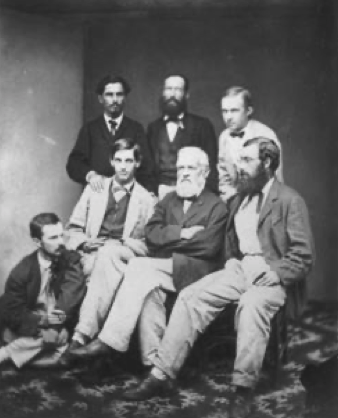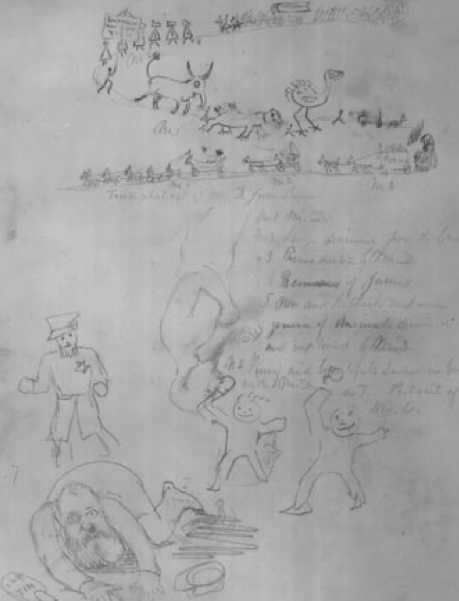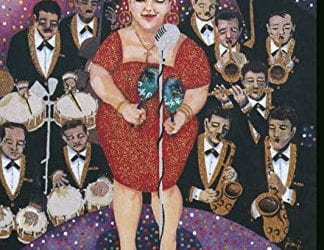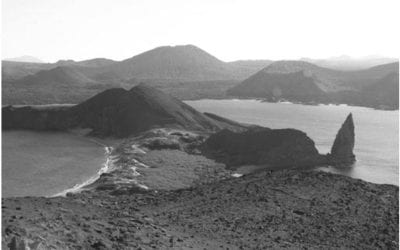The Nature of Tropical Nature
Brazil Through the Eyes of William James
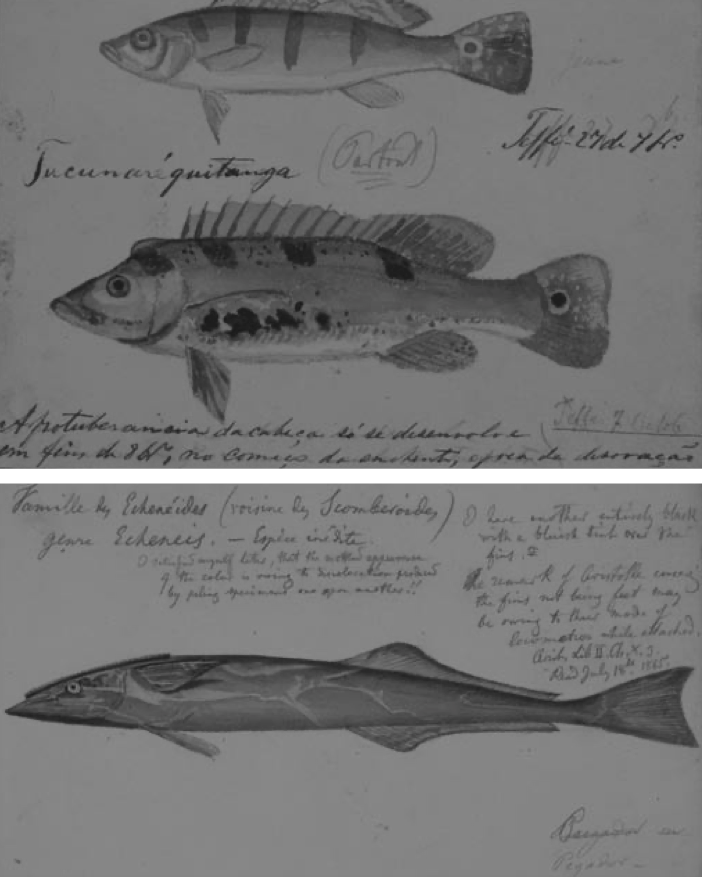
ILLUSTRATIONS COURTESY OF THE ERNST MARY LIBRARY OF THE MUSEUM OF FALL 2004/WINTER 2005•ReVista 17 COMPARATIVE ZOOLOGY© PRESIDENT AND FELLOWS OF HARVARD COLLEGE
To a Brazilian, nothing sounds more familiar than statements that Brazil has been blessed in terms of nature. Indeed, from our earliest childhood, we learn to identify our country through enthusiastic manifestations about the wonders of our geography, not to mention the flora and fauna whose extraordinary diversity and wealth comprise the treasures that God generously bestowed upon us (of course, while all other nations have had to work hard to amass wealth). Even Pedro Vaz de Caminha’s inspired letter reporting the discovery of new lands to the King of Portugal in 1500, which described these lands in terms of Eden, seems to predict that our destiny was to be a part of nature. Nothing but nature.
Precociously announced in the early colonial period’s “visions of Eden,” this destiny became more fully established in 19th-century travel narratives, which recreated the discovery of new lands and reproduced the initial awe expressed by the early chroniclers in their descriptions of an earthly Paradise. In describing diverse species of monkeys, sloths, manatees, and other wonders of the animal kingdom (which in a sense included mention of naked savages), all allocated in an atemporal natural setting of tropical forests and rivers, 19th-century travel literature often identified Brazil in terms of its exotic flora and fauna, above and beyond any recognition of its social implications.
As a scholar interested in travel accounts written in this period, I find myself almost compelled to sympathize with the few luminous writers who in one way or another strayed away from the general tone, helping make our nature-prison less panoptic. For example, I cannot help identifying myself with a passage from the great Machado de Assis, novelist and social critic who in 1892 expressed his anguish with our often compliant objectification: “This adulation of nature has always caused pain to my nativistic heart, or whatever it might be called.” Continuing his weekly chronicle in the usual mordant, ironic tone, Machado displayed his discomfort with our reification as tropical nature, in describing a visit to the Castelo Hill in Rio de Janeiro, showing a foreign visitor a colonial church: “I am aware that these are not the ruins of Athens; but one can only show what he has. The visitor went in, took a quick look, came out and settled against the outer wall, gazing at the sea, the sky and the mountains. After about five minutes, he exclaimed: ‘What nature you have!’…Our guest’s admiration excluded any idea whatsoever of human action. He didn’t ask me when the fortresses were built, or the names of the ships anchored in the harbor. Nothing but nature” (cited in Flora Sussekind, O Brasil não é longe daqui, p. 267).
And what does this have to do with William James’s journey to Brazil in 1865-66, as a member of the Thayer Expedition, which was led by Louis Agassiz, director of the Museum of Comparative Zoology and influential professor at Harvard’s Lawrence School? Well, from the moment I set eyes on James’ Brazilian papers, written when he was only 23 years old, I noticed something of an original spirit palpitating. In spite of being part of a naturalist’s journey, organized according to well-established patterns, James seemed to establish himself in a position of intellectual independence. His voice was different from those who only sought to produce a rationalizing, extractive, and dissociative understanding, suppressing functional and experiential relations between people, plants, and animals, consolidating a descriptive paradigm that appropriated an apparently benign and totally abstract world, producing a naive and utopian vision of male, European authority (cf. Mary Pratt, Imperial Eyes). Unlike what one would expect from someone involved as a volunteer in a scientific collecting expedition, James engaged in a different kind of intellectual journey during the eight months of his sojourn in Brazil, spent mostly in Rio de Janeiro and in the Amazon. He scribbled letters to his family, wrote a brief (incomplete) narrative describing his trip to the Solimões River, maintained a journal, and sketched a series of drawings depicting scenes and people from the expedition, which express not only a critical consciousness but also a moral distance from the colonialist intellectual enterprise that guided the expedition. Because of this, although James’s Brazilian writings are well known to all the scholars—including Ralph Barton Perry, Gerald Myers, Howard Feinstein, Kim Townsend, Louis Menand, Paul Jerome Croce, Daniel Bjork, and many others—who meticulously have studied this charismatic figure from the perspective of his intellectual biography and his place in the history of Harvard’s consolidation as a modern university, these papers have yet to receive attention within the wider context of nineteenth-century travel literature. They stand out in terms of the special empathy that James displays in his observations on the tropical environment and the nonwhite populations that inhabited it. Among Latin Americanists, only Nancy Stepan dedicated some attention to James’s papers in her recent book, Picturing Tropical Nature. Furthermore, I believe that an analysis informed by this perspective can offer a new fold to the well-known biography of the founder of Pragmatism.
Of course, James’s Brazilian writings are not always, shall we say, illuminated by an empathetic and relativistic approach. James expresses many feelings and emotions in his letters and journal, beginning with his ambivalence in relation to the significance of the journey itself. He narrated moments of boredom and restlessness, revealing his desire to go home as soon as possible or his irritation with the lethargy and inefficiency of the natives, as one might expect from a young man facing such a journey. The trip was not only strenuous, endeavoring to cover little known areas of South America, but it separated James for the first time from a very absorbing family, placing him under the orders of Agassiz, who was prone to erratic and tempestuous decisions, changing travel plans spuriously and keeping his subordinates always at his beck and call.
In addition, James caught what he believed to be smallpox during the first months of his stay in Rio de Janeiro, with potentially dire consequences that deepened his indisposition towards the journey for months. Agassiz, however, claimed that James suffered from a more benign illness. He continued his schedule of social and scientific visits to surrounding plantations, leaving his student to face a serious health risk that left the young man temporarily blind.
On some occasions, James simply succumbed to the exotic, as for example in his frequently cited letter to Henry James, dispatched from the “Original Seat of the Garden of Eden,” in which he employs images derived from a standard repertory of descriptions of tropical nature. “No words but only the savage inarticulate cries can express the gorgeous loveliness of the walk I have been taking”, he wrote. “Houp la la! The bewildering profusion & confusion of the vegetation, the inexhaustible variety of its forms & tints (yet they tell us we are in the winter when much of its brilliancy is lost)are literally such as you have never dreamt of. The brilliancy of the sky & the clouds, the effect of the atmosphere wh. gives their proportional distance to the diverse planes of the landscape make you admire the old Gal nature.” Later in the same letter, James appeals decidedly to the exotic, characterizing his surroundings as “inextricable forests” and referring to the local inhabitants as a naturalized component of the landscape: “On my left up the hill there rises the wonderful, inextricable, impenetrable forest, on my right the hill plunges down into a carpet of vegetation wh. reaches to the hills beyond, wh. rise further back into the mountains. Down in the valley I see 3 or four thatched mud hovels of negroes, embosomed in their vivid patches of banana trees.” These hyperbolic exclamations invite the reader to imagine a pristine, mysterious, and especially impenetrable landscape, quite consistent with conventional notions in the Northern Hemisphere regarding tropical nature.
This is how many of James’s biographers imagined the journey, citing and analyzing this letter as an illustration of the kind of intellectual and emotional experience evoked by the lush and liberating world of tropical forests. Although James did not specify the exact location of this excursion, clearly it took place in the Tijuca Forest, only a few miles (not 20, as James supposed, but around 8, as established by the Agassiz couple in their Journey in Brazil) from the urban center of Rio de Janeiro, a pleasant location frequented by the upper crust of Rio’s society on weekends for strolls and picnics. On that occasion, Agassiz’s party stayed overnight at the Bennett Hotel, belonging to an Englishman and boasting modern amenities. Tijuca, of course, was and still is lovely, in spite of the high-class residential neighborhoods and shopping malls that occupy the region. However, it hardly represented a tropical jungle experience, as James in fact was to experience in later months in the Amazon. From the vantage point of mid-19th century Rio de Janeiro, an excursion to the Tijuca Forest was little more than a polite social outing, not unlike an excursion that contemporary Bostonians or Cantabridgians might make to the shores of Walden Pond on a summer day!
James can be surprising, though. One expects him to be conventional, with salutes to the exotic character of the natives and odes to a mysterious, atemporal, and asocial Nature, as a traveler who seeks to establish a secure emotional distance from his experience, fearing the risks of liberating the unconscious. But James takes risks and not only is he particularly perceptive in his demolition of the tropical nature myth, but also he is capable of empathizing with that which he describes, including the native populations. He invites his readers to discover that Rio de Janeiro had a European air to it (“The streets in town & shops remind you so much of Europe”, in a letter dated April 21, 1865), that the Amazon was relatively civilized (“This expedition has been far less adventurous & far more picturesque than I expected. I have not yet seen a single snake wild here…” letter, Oct. 21, 1865), and finally that the tropical environment was not all that mysterious, but rather somewhat tedious and repetitive (“here all is monotonous, in life and in nature that you are rocked into a kind of sleep…”, Dec. 9, 1865).
- William James, Louis Agassiz and other expedition members. Right: James took copious notes and illustrated them.
James is at his best when he shows that he is capable of empathizing with the local inhabitants, guides, fishermen, and others, the Indians, Blacks, and mestizoes who accompanied the collecting excursions, often as his only companions. In one of my favorite passages, James, obviously greatly inspired on that day, observed a conversation between his boatmen and a group of Indian women who conducted a canoes downstream on the Solimões River: “I marvelled, as I always do, at the quiet urbane polite tone of the conversation between my friends and the old lady. Is it race or is it circumstance that makes these people so refined and well bred? No gentleman of Europe has better manners and yet these are peasants” (William James Diary, 1865-66, Houghton Archives). This and other luminous passages written in a disinterested tone show how the young James dealt with the problematical concept of race informally by turning it on its head, showing signs of the charismatic and brilliant teacher that was to exert a special attraction over those who came to know him. In confronting the conventional, stereotyped repertory of tropical travel narratives, James exercised his peculiar skill of empathizing with the world that surrounded him, relativizing cultural codes in their own terms. For someone like James, who had begun the trip with a terrible seasickness and who soon discovered “[i]f there is any thing I hate it is collecting” (letter dated Oct. 21, 1865), the journey to Brazil ended up being quite productive.
Revealing an unconventional and empathetic traveler, James’s Brazilian papers have yet to be subjected to a theoretical inquiry that is more appropriate to the kind of experience he lived and the kind of account he produced. It is in this spirit that I am preparing a critical edition of this material. After all, amidst the suffering and deprivation that a tropical journey could cause in the mid-1860s, we find a distinctive approach in the first discovery of the other, the other who James, not without some effort, pleasantly came to appreciate.
Fall 2004/Winter 2005, Volume III, Number 1
Maria Helena Machado is a Professor of Latin American History, University of São Paulo. A 2003-2004 DRCLAS Visiting Scholar, she is currently preparing a critical edition of James’ Brazilian papers.
John Monteiro, 2003-2004 Visiting Professor in Harvard’s Department of History, translated this article from Portuguese.
Related Articles
Editor’s Letter: Flora and Fauna
Ellen Schneider’s description of Sandinista leader Daniel Ortega in her provocative article on Nicaraguan democracy sent me scurrying to my oversized scrapbooks of newspaper articles. I wanted to show her that rather than being perceived as a caudillo
Bilingual Aesthetics: A New Sentimental Education
After an exhausting game of soccer with a crew of Mexico City street children, Vicente, a young teenager of 13 said, “Vamonos a la verga.” It was my third day with Casa Alianza, the international…
Nature and Citizenship
Two first-time visitors to the Galapagos archipelago begin their experience in exactly the same way. Two hours after departing mainland Ecuador, their plane descends towards the island of…

